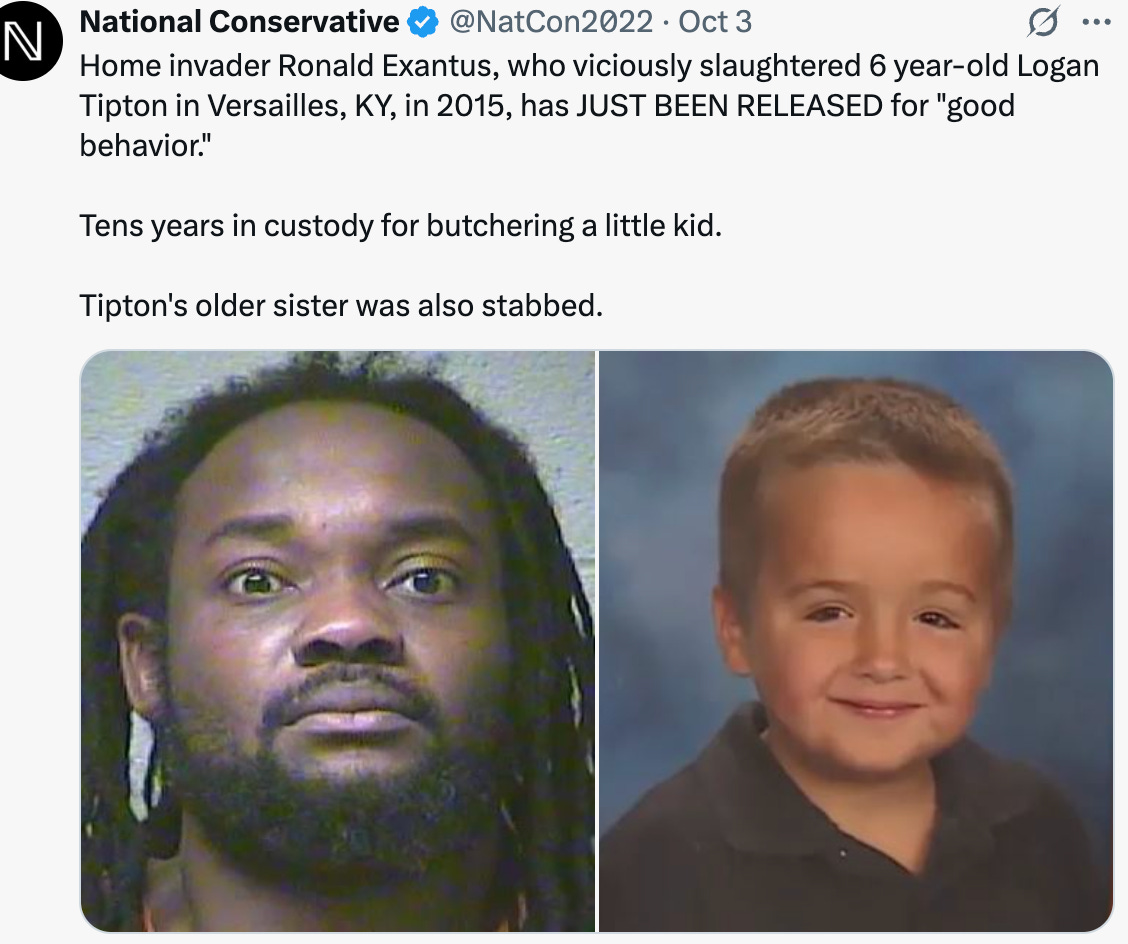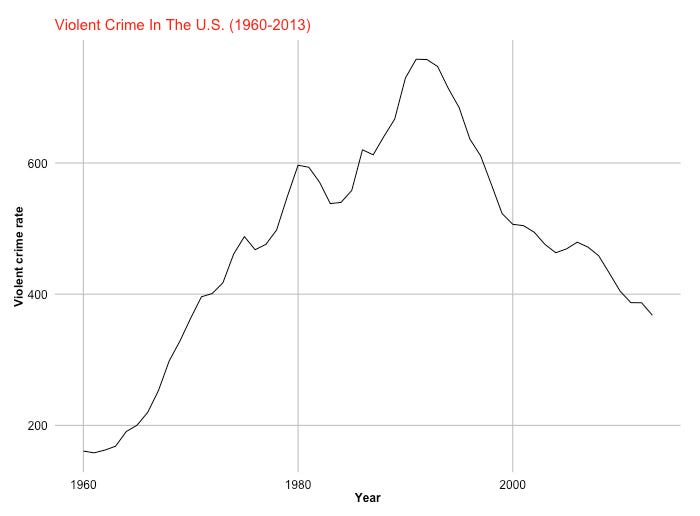Why We Hang Horse Thieves
In Defense of Capital Punishment
George Savile, 1st Marquess of Halifax: “Men are not hanged for stealing horses, but that horses may not be stolen.”
“The wicked become even worse when they are tolerated.” -Tolstoy
Listen to the audio version of this article here, a benefit for paid subscribers:
The Pro-Crime Mindset
In the wake of Iryna Zarutska’s horrific murder at the hands of fourteen-time arrestee Decarlos Brown Jr., one of the trends that has taken off on X—one perhaps enabled by the death of the DOJ’s Community Relations Service1—has been to call attention to similar crimes, where lifelong thugs were let off by the justice system despite the horrific nature of the crimes they committed. Often, they then went on to commit yet worse crimes.
To show but a few, all of which are heart-rending and were entirely preventable:
A related mindset, a manifestation of the same pro-crime impulse—the idea that criminals are the real victims and that really those on whom they inflicted their terrible depredations ought be blamed—has been similarly exposed online in recent weeks.
The would-be assassin of Justice Brett Kavanaugh got only 8 years in prison, 22 years less than requested by the prosecution. The judge gave him a mere slap on the wrist because she thought he should receive mercy on account of his being transgender, and because the case has improved his family’s sense of acceptance of his trans identity.2
A thug in Wicomico County, Maryland, assaulted a female classmate and beat her half to death. The female victim was then blamed for reportedly saying a mean word to the thug who attacked her…after having been attacked.
Then there is the Mayor of Seattle, who insists that felons who have been caught committing crimes seven or eight times might be stealing your wallet or a pair of sneakers because they are “hungry,” and thus no criminals should be jailed.
And then there’s Karmelo Anthony, who stabbed Austin Metcalf to death at a track meet. He got to graduate high school, is going to college, and isn’t even in jail despite the fact that his victim’s body is barely cold. Texas has also refused to release footage of the stabbing, presumably because it’s as incendiary as that of Irnya getting murdered by Decarlos Brown. Karmelo’s supporters, meanwhile, have insisted that he—who was (allegedly) previously suspended for bringing a knife to school3—was in the right when he stabbed an unarmed track athlete to death.
Then there are the obviously political plea deals. Career criminals, Antifa freaks, Weather Underground terrorists…for decades, violent criminals have gotten off with slaps on the wrist because the prosecution doesn’t feel like throwing the book at them. Most recently, this meant the below spiteful mutant Antifa member was, despite being a violent domestic terrorist who attacked cops with a knife, given a mere “resisting arrest” sentence.4
All in all, what is clear is that justice is dead in most of America. If a thuggish felon can stab a boy to death in the supposedly conservative state of Kentucky, be found guilty of that horrific crime, and then spend less than a decade in prison, justice is dead. In a just society, he would have been hanged long ago. Yet he never was. Now he’s out of prison, free to commit more such crimes against defenseless families. “Try that in a small town,” indeed.
In fact, in each and every case thus presented, whether the Antifa freak who tried to stab a police officer to death or Ronald Exantus, the demented murderer of little Logan Tipton, the hanging should have already been carried out. The attackers and killers are obviously guilty. What they did was horrible. They ought to have been hanged for all our benefit, after a just and fair trial, to free us of their depredations. “The good book says it, so you know it’s the truth,” as Charlie Daniels sings of “an eye for an eye, a tooth for a tooth” in his Simple Man. And correct he was; the death penalty is Biblical.
Yet it is not used in most states, and in those where it is, it is used sparingly. Instead of facing justice, members of the criminal underclass are given countless opportunities to commit horrific predations upon the productive and law-abiding members of society.
It’s all very South African, and is occurring for the same anarcho-tyrannic reason: the members of the spiteful mutant coalition are used as tools of the regime to oppress and extract from normal people while foisting insanity upon them. As Jack Posobiec put it in his book on Antifa, “There is a reason you rarely see Antifa challenge the actual power structure in the United States. Those in power use Antifa as their shock troops to go after anyone who challenges them.” That is true, but it applies to all of the criminal underclass, not just Antifa.
Such a state of things—a broad toleration for even murderous criminality so long as it is inflicted upon the productive and law-abiding—is not the process on which the West was built. It is very much the opposite, in fact.
The Building of the West
As the Marquess of Halifax’s quote indicates, hanging was once quite common, being used to punish about 220 different crimes.5 Indeed, most of the Occident had such policies: over the course of the Middle Ages, about 1% of each and every generation was executed for some crime or another, whether at the scene of the crime or after a trial.6
The result was that Europe’s crime rate—particularly its murder rate—plummeted, and by the time of glorious Georgian England, hanging was relatively rare. It became largely unnecessary, as the hangman’s justice had served as the necessary life guard in the gene pool. “Genetic pacification” occurred, as the study’s authors put it.7
As a predisposition for criminality—like one’s political outlook8—is a largely genetic phenomenon,9 a centuries-long selective breeding project focused on weeding criminality out of the population by executing those who exhibited it worked quite well. And, thanks to the centuries-long policy of not tolerating crime, Europe could focus on high civilization and achieving great things instead of contemplating how best to “rehabilitate” murderous felons already convicted 39 times.
Key to that success in establishing a civilized world is that the point of the exercise was not to “rehabilitate” those who had shown by their own actions that they could not be rehabilitated. Vengeance, and ridding society of their evil, was the point—and widely regarded as firmly in line with the Christian tradition.
Further, it was done quickly: as late as 1860, murderous terrorist John Brown was hanged within a month and a half of his deadly Harper’s Ferry raid. He was properly arrested, received a fair trial, was found guilty, and was soon hanged; no time was wasted, and his punishment came as soon after his treason as justice allowed.
When Brown’s hanging occurred, as was true of past such cases as well, the point of the endeavor was clear: as the quoted marquess said, the executions occurred so that the behavior that led to them would not again occur. The point was to keep everyone free from the tyranny of rampant criminality, whether of the theft sort, murder sort, or anything in between, and so merciless, swift, and severe justice was used to fix the problem.
Executions both deterred those who could be deterred, and weeded out from the garden of society those who could not be deterred. For if one could not be convinced to forgo the slight advantage that comes with stealing an apple or a horse when the clear cost of doing so is death, what reason was there to suspect that such a person could be deterred or rehabilitated at all? There is none, and Europe’s criminal justice policy reflected as much. And so, as the marquess said, horse thieves were hanged.
Restorative Justice is Injustice
None of that is now the case. Instead of swift and severe justice of the old sort, we are burdened with the ideology of “restorative” and “rehabilitative” justice. Criminals, so the theory goes, were either brought up poorly or merely in the wrong place at the wrong time. They are not naturally predatory, parasitic, or antisocial, but rather naturally productive citizens who can be fixed if only given the right opportunities and mild correctives.
Thus, so the thoughts of these types go, they ought be cared for in relatively pleasant prison conditions, nurtured by the state (at the expense of the taxpayer, including their victims), and eventually released back into society where they can go on to build spaceships and fusion reactors after a brief prison stint for having sawn a woman’s head off or stabbed a little boy to death.
It would be an understatement to say that such an approach hasn’t worked. In fact, a near-majority of crimes are committed by those who have already been convicted of multiple other offenses:
When looked at in terms of arrests rather than convictions, with the understanding in mind that pro-crime DAs involved with organizations like the Wren Collective10 generally refuse to prosecute even those arrested for major crimes, the data is even starker: a supermajority of prison inmates have almost a half-dozen arrests to their name at the point they finally face spending some time behind bars:11
That is to say, the criminal underclass has not been rehabilitated. Our half-century-long experiment in tolerating wicked behavior has led only to an explosion in wickedness, not a burgeoning class of former convicts turned rocket scientists and theoretical physicists. And we are all paying the price, as criminals who have been released dozens of times have turned our cities into living hells more dangerous than active warzones. Hence why crime shot up like a rocket in the 60s and 70s once the restorative justice delusion was embraced.
Of course, it is unclear whether the point was ever rehabilitation. It is much more likely that those who inflicted this great evil upon us did so because they wanted12 to turn America into South Africa than because they really think that the murderous monster who stabbed a little boy in the head so many times he bent the knife (the Ronald Exantus case) can somehow become a productive member of society. Perhaps they are dumb enough to believe the latter; many such imbecilities are believed by those who are committed to the egalitarian delusion.
Regardless, the fact that so many Americans have accepted the ideal of “restorative justice” that has been around since the 1970s,13 the same time that the Black Liberation Army was turning NYC into a third-world city, shows that there is a major misunderstanding about the point of punishing crime. It is generally not, as with spanking a child, to interpose a sharp but slight punishment to put an otherwise promising person back on the straight and narrow. Rather, the point is to stop future crimes from happening by making the obvious costs of it so severe that no one who can restrain themselves thinks that it is a good idea, and to simultaneously weed out those who can’t restrain themselves from criminality from society.
Such cuts through most of the nonsensical noise of modern criminal justice.
No, insane murderers should not be allowed to get away with their depredations because they are too dumb to understand that murder is wrong. Such should be an aggravating circumstance, as it shows that we cannot hope to deter them. While sad, such is life; a rabies-afflicted dog cannot be helped, nor can a murderous lunatic who doesn’t understand that crime is wrong and that stabbing a woman in the neck out of racial resentment is bad.
Similarly, the point is not to inflict tit-for-tat punishment; whether a crime is large or minor is largely irrelevant. Rather, as with the horse-theft example, the point is to prevent such things from ever again occurring, whether at the hands of the criminal at issue or another one. The question is not whether the horse or the thief is of more value (likely the horse), but whether the anti-social behavior of horse thievery will be tolerated or not.
So, three-strikes laws are not bad just because one can be put away for life even if the third offense is a rather minor one:14 if a man cannot help himself from thievery of some minor object yet again, despite knowing he’ll never again breathe free air if caught, of what use is keeping that thief around? Has he not shown himself to be irredeemable, unable to be restored or to be fixed, and a major burden on everyone else in society with his continual depredations? The only way to fix that, then, is to permanently remove him from society.
Such a policy probably seems cruel. It is certainly unpleasant, in most respects. But it is, nevertheless, necessary. Society does not function when criminal behavior is allowed: this was a central insight of our ancestors and is why they executed about 1% of every generation. If we are to have a high culture as they did, if we are to grow into a flourishing civilization as they did, we need the same approach to handling crime.
For too long, we have lived to serve those who are only predatory and parasitic. We lack a proper space exploration and colonization program because ineffectively babysitting cannibals and communists in the post-colonial world was deemed more important. Disparate impact law has eradicated unknowably vast capital sums while blocking the next generation of talented young men from advancing, because merit was deemed discriminatory. The massive success of colonization was destroyed because egalitarianism was deemed more important. On and on it goes.
And, of course, trillions of dollars in value have been destroyed in our cities, the sterile friction of suburban life foisted upon normal people, and huge injustices not just tolerated but practically encouraged by the state because punishing crime was deemed “mean” in the 60s and 70s. Now we live with the consequences of that, which are exactly as could be predicted: tolerating evil has led only to more evil.
We must stop tolerating evil. We must stop making peace with it. We must stop allowing those who encourage evil to get away with doing so.
And that gets to the central truth, the important lesson from even a cursory glance at the history of capital punishment: we don’t need to live like this. Our cities needn’t be warzones, our families needn’t be at risk, and criminals needn’t be prowling the streets. All of that is a policy choice our leaders have chosen, not an immutable fact.
So, the solution is not to continue onward with the dreadful yoke of predatory criminality upon our necks. That is a choice, and the yoke must be broken. Crime is a solvable problem. We can and should choose the solution to it again.
Doing so is how our civilization rose above the muck and mire of constant violence and upheaval. Embracing capital punishment—a form of justice that is good and Biblical—is how the West became excellent, how it could focus on greater things than avoiding the robber’s knife. They could build and conquer, invent and invest, rather than forever live under the burden of the criminal yoke.
The sad fact is that restorative justice doesn’t work. Some men cannot be deterred or reformed; they simply want to wreak havoc. It is to deal with them that our ancestors embraced capital punishment. We must do so as well, if we too are to escape the quicksand of society-wrecking criminality. We must not make peace with evil, or attempt to restore it, but instead destroy it.
If you found value in this article, please consider liking it using the button below, and upgrading to become a paid subscriber. That subscriber revenue supports the project and aids my attempts to share these important stories, such as the recent one on Civil War, and what they mean for you.
Some short and sweet details on CRS and what it was up to here: https://x.com/Anc_Aesthetics/status/1973485675254071485
As noted here: https://x.com/lacherbauer/status/1967373482490212691



![[AUDIO] Why We Hang Horse Thieves](https://substackcdn.com/image/fetch/$s_!GvtO!,w_140,h_140,c_fill,f_auto,q_auto:good,fl_progressive:steep,g_auto/https%3A%2F%2Fsubstack-video.s3.amazonaws.com%2Fvideo_upload%2Fpost%2F175547593%2F0798f42b-64eb-41e6-9aab-82f717de9b8d%2Ftranscoded-1759858008.png)











The arguments for excusing crimes, whether mundane or horrific, on the basis of circumstances of birth, is above all a cruel insult to every law abiding person who has grown up in difficult circumstances. Not just an insult but a grave moral hazard. If the only consequence of obeying the law is to have less material wealth and less status than your peers, social collapse soon follows.
I think that this article plays to my bias and tells me what I already knew. Thanks. Good article.